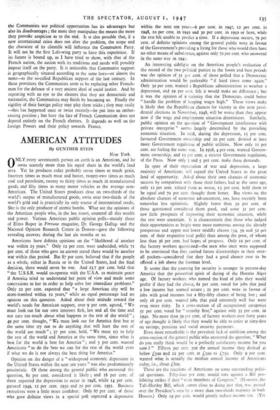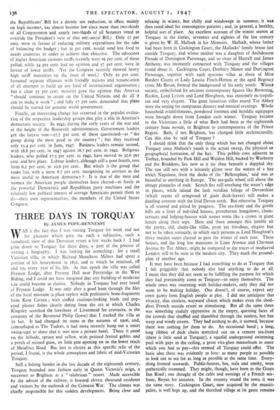AMERICAN ATTITUDES
By GUNTHER STEIN New York.
ONLY every seventeenth person on earth is an American, and he owns scarcely more than his equal share in the world's land area. Yet he produces today probably seven times as much grain, fourteen times as much meat and butter, twenty-two times as much coal and petroleum, twenty to thirty times as much in manufactured goods and fifty times as many motor vehicles as the average non- American. The United States produces close on two-thirds of the world's output of manufactured goods, owns over two-thirds of the world's gold and is practically its only source of international credit. She is the only producer of atomic bombs. What are the opinions of the American people who, in the last resort, countrol all this wealth and power. Various American public opinion polls mainly those of Elmo Roper in Fortune magazine, Dr. George Gallup and the National Opinion Research Centre in Denver—gave the following revealing answers during the last six months or so.
Americans have definite opinions on the " likelihood of another war within 25 years." Only 12 per cent. were undecided, while 71 per cent. of those who gave an answer stated there would be another war within that period. But 87 per cent. believed that if the people as a whole, either in Russia or in the United States, had the final decision, there would never be war. And 23.7 per cent. held that "the U.S.S.R. would co-operate with the U.S.A. to maintain peace if America tried to understand her point of view and made some concessions to her in order to help solve her immediate problems." Only 22 per cent. expected that " a large American city will be atom-bombed within to years," while an equal percentage had no opinion on this question. Asked about their attitude toward the world's needs for American support, over 9 per cent. agreed, " We must look out for our own interests first, last and all the time and not care too much about what happens to the rest of the World " ; 49 per cent. thought, " We must look out for America first but at the same time try not to do anything that will hurt the rest of the world too much" ; 37 per cent. held, " We must try to help the rest of the world and America at the same time, since what is best for the world is best for America " ; and 5 per cent. wanted Americans " to do the best we can for the rest of the world even if what we do is not always the best thing for America."
Opinion on the danger of a " widespread economic depression in the United States within the next ten years " was also predominantly pessimistic. Of those among the general public who answered the question, 8o per cent. considered it likely ; and 18 per cent. of them expected the depression to occur in 1948, while 14 per cent. guessed 1949, 12 per cent. 195o and 20 per cent. 1951. Business executives were a little more confident. Only 67 per cent. of those who gave definite views in a special poll expected a depression within the next ten years-6 per cent. in 1947, 12 per cent. in 1948, to per cent. in 1949 and 3o per cent. in 195o or later, while the rest felt unable to predict a rime. If a depression occurs, 79 per cent. of definite -opinions among the general public were in favour of the Government's providing a living for those who would then have no other means of subsistence, against only 7o per cent. who answered in the same way in 1940.
An interesting sidelight on the American people's evaluation of the record of the two political parties in the boom and bust periods was the opinion of 51 per cent. of those polled that a Democratic administration would be preferable " if hard times come again." Only 3o per cent. wanted a Republican administration to weather a depression, and 19 per cent. felt it would make no difference ; but it was the opinion of a majority that the Democrats could better "handle the problem of keeping wages high." These views make it likely that the Republican chances for victory in the next presi- dential elections in November, 1948, will be worse than they appear now if the wage and employment situation deteriorates. Similarly, public opinion on the question of " Government interference with private enterprise " seems largely determined by the prevailing economic situation. In 1938, during the depression, 15 per cent. favoured Government ownership and 20 per cent. desired at least more Government regulation of public utilities. Now only it per cent. are feeling the same way. In 1938, 4 per cent. wanted Govern- ment ownership, and to per cent. a stricter Government regulation, of the Press. Now only 3 and 5 per cent. make these demands.
In spite of their expectation of war and depression, a large majority of Americans still regard the United States as the great land of opportunity. Asked about their own chances of economic success by comparison with those their fathers had at the same age, only 12 per cent. valued them as worse, 13 per cent. held them to be equal and 7o per cent. thought them better. But views on the absolute chances of economic advancement, too, have recently been somewhat less optimistic. Slightly fewer than 5o per cent. of those questioned considered them good, and some 31 per cent. saw little prospects of improving their economic situation, while the rest were uncertain. It is characteristic that those who judged their opportunities as bright were more numerous among the already prosperous and upper and lower middle classes (54, 59 and 52 per cent. of their respective total polls) than among the poor, of whom less than 36 per cent. had hopes of progress. Only 19 per cent. of the factory workers questioned—the men who once were supposed to be convinced that they carried future directorships in their over- all pockets—considered that they had a good chance ever to be offered a job above the foreman level.
It seems that the yearning for security is stronger in present-day America that the proverbial spirit of daring of the Horatio Alger age. Of factory workers who named the kind of jobs they would prefer if they had the choice, 61 per cent. voted for jobs that paid a low income but seemed secure ; 21 per cent. were in favour of jobs with good incomes but a fifty-fifty chance of being lost ; and only 16 per cent. wanted jobs that paid extremely well but were even more risky. In a cross-section of all occupational categories 5x per cent. voted for " security first," against only 33 per cent. in 1940. No more than 39 per cent. of factory workers over forty years of age thought it likely that they would be able to retire at sixty-five on savings, pensions and social security payments.
Even more remarkable is the prevalent lack of ambition among the cross-section of the general public who answered the question, " Whet do you really think would be a perfectly satisfactory income for you now ? " Fifteen per cent. put the annual income they desired at below L50co and 22 per cent. at L50o to £750. Only 9 per cent. wanted what is actually the median annual income of Americans today, i.e., about £800.
These are the reactions of Americans on some outstanding politi- cal questions. Fifty-four per cent. would vote against a Bill pro- hibiting strikes if they " were members of Congress." (However, the Taft-Hartley Bill, which comes close to doing just that, was passed over the President's veto by a more than two-thirds majority in both Houses.) Only 19 per cent, would greatly reduce income tax. (Yet
the Republicans' Bill for a drastic tax reduction, in effect mainly on high incomes, has almost become law since more than two-thirds of all Congressmen and nearly two-thirds of all Senators voted to override the President's veto of that anti-social Bill.) Only 17 per cent. were in favour of reducing military expenditure for the sake of balancing the budget ; but 31 per cent. would send less food to needy countries in order to achieve that objective. The advocates of higher American customs tariffs recently were 19 per cent. of those polled, while 24 per cent. had no opinion and 57 per cent. were in favour of lower tariffs. (Yet the Congress recently showed heavy high tariff majorities on the issue of wool.) Only to per cent. favoured separate alliances with friendly nations and renunciation of all attempts to build up any kind of international organisation ; but a clear 55 per cent. majority gave the opinion that America " should continue to count on the United Nations and do all it can to make it work " ; and fully 17 per cent. demanded that plans should be started for genuine world government.
Finally, an interesting change has occurred in the popular evalua- tion of the respective leadership groups that play a role in America's democratic society. In 1942, during the early years of the war and at the height of the Roosevelt administration, Government leaders got the largest vote-27.7 per cent. of those questioned—as " the group doing the most good to the country " ; but they received only 15.4 per cent. in June, 1947. Business leaders remain second, with 18.8 per cent. in 1947 against 18.7 per cent. in 1942. Religious leaders, who polled 17.5 per cent. in 1942, have moved to 32.6 per cent. and first place. Labour leaders, although still a poor fourth, rose from 6.2 per cent. to to.6 per cent. But which is the group that ranks last. with a mere 6.7 per cent. recognising its services as the most useful to American democracy ? It is that of the men and women the American people themselves have elected—as freely as the powerful Democratic and Republican party machines and the relatively low political interest of average Americans permit them to do—their own representatives, the members of the United States Congress.



































 Previous page
Previous page